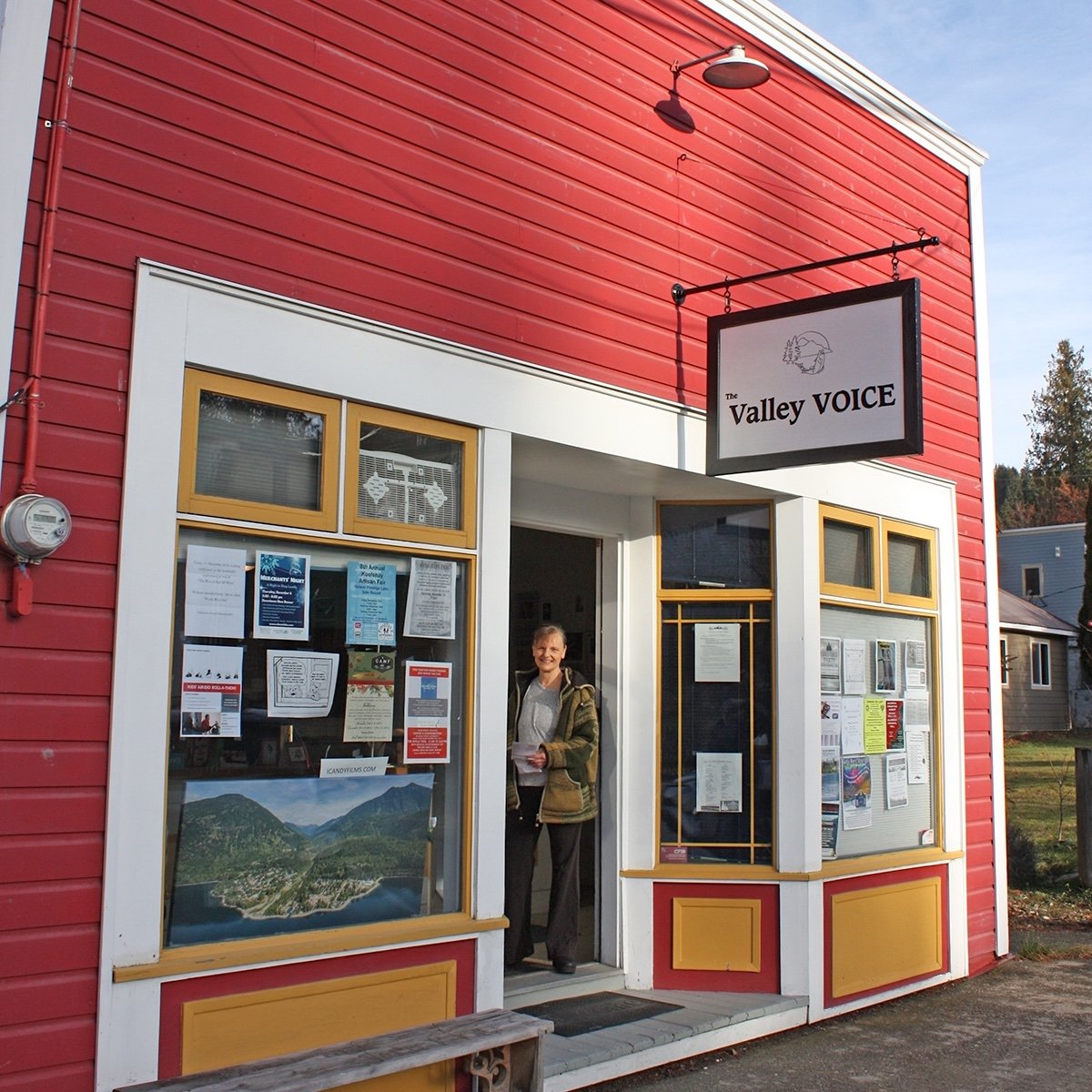Dan Nicholson and Jan McMurray are retiring and want you to buy their business. The operation is 30 years old, has thousands of customers and made a profit last year, and its rivals all just closed down. Rent is just $700 a month.
The only catch? Nicholson and McMurray’s business is a newspaper located in B.C.’s sparsely populated West Kootenay region.
In another time and place, families and corporations would battle for control over a media monopoly — even one as small as that of the New Denver-based Valley Voice.
But Nicholson and McMurray’s impending retirement has spurred a different type of succession drama, in which locals like Kathy Hartman rally to help save the local news outlet at the centre of life in the West Kootenay’s tiny but vibrant towns.
From Edgewood to Sloca…
Dan Nicholson and Jan McMurray are retiring and want you to buy their business. The operation is 30 years old, has thousands of customers and made a profit last year, and its rivals all just closed down. Rent is just $700 a month.
The only catch? Nicholson and McMurray’s business is a newspaper located in B.C.’s sparsely populated West Kootenay region.
In another time and place, families and corporations would battle for control over a media monopoly — even one as small as that of the New Denver-based Valley Voice.
But Nicholson and McMurray’s impending retirement has spurred a different type of succession drama, in which locals like Kathy Hartman rally to help save the local news outlet at the centre of life in the West Kootenay’s tiny but vibrant towns.
From Edgewood to Slocan to Kaslo, thousands of locals depend on the Valley Voice not just to learn about their neighbours, but to spur themselves to activism and community participation, according to Hartman.
“Usually what happens is people read about something in the paper [and] you get together, rent the hall, start working on things from there,” she told The Tyee.
That same spirit is now prompting locals to seek ways to save their local newspaper as its longtime owners say goodbye.
The Voice of a valley
The Valley Voice is a throwback. In a modern media world that prioritizes large photos, refined design and headlines optimized for search engines, the Voice focuses instead on delivering densely packed local information in unfussy print newspaper form.
The publication covers a vast geographical area and a scattering of small but unique towns, of which Nakusp and Kaslo, with populations of about 1,500 and 1,000 residents, respectively, are the largest. Around 6,000 copies are delivered for free to postboxes in the Arrow Lakes, Slocan and Kootenay Lake valleys. Another 1,500 are distributed at stores throughout the region.
The Voice’s bread and butter is its letters-to-the-editor section and coverage of local municipal councils. Its most recent edition included a 700-word breakdown of the last meeting of Silverton council. That’s about four words for each of Silverton’s 149 residents. (The village is B.C.’s second-smallest municipality.) The highlight: a debate about a new mural. One councillor fretted that the painting could distract highway drivers; a colleague speculated the mural could prompt drivers to slow down and improve safety.
The Voice was founded in 1992 by a pair of local women. McMurray and Nicholson arrived in the Kootenays shortly after, drawn by the beauty of the region’s valleys and its tight-knit, quirky communities populated by draft dodgers, activists, artists and musicians.
Shortly after arriving, Nicholson, who had started his own paper in Manitoba, approached the owners to inquire about a job. That didn’t pan out, and the pair worked a series of precarious jobs over the next decade. But they stayed in touch with the paper’s operators, and when the outlet was put up for sale in 2003, they scooped it up. (The owner, Bonnie Greensword, reportedly accepted less from the couple than the provincewide chain Black Press had offered.)
The Voice gave the couple steady employment and a business to call their own.
“We have made a good living, raising our three children, on this business,” they wrote recently in an information package published to inform potential purchasers.
But small-town newspapering was hardly easy. Everyone who knows the Voice and its operators talks about how much time the couple poured into the paper. The publication was a 24-7 endeavour. Nicholson laid out the pages. McMurray wrote stories and edited copy. And both sold ads and schmoozed.
“It’s a lot of hours, right?” McMurray told The Tyee. “That was a bit of a bummer for our kids, who were six and nine and 14 when we bought it. But we were able to make this work as a one and only job and provide for our family.”
Over two decades, the Voice continued to provide even as other publications encountered tough times.
As newspaper companies started publishing all their content online, McMurray and Nicholson balked. They considered the time and effort involved and then evaluated the benefits. The Voice remained mostly offline.
“We were sort of going, ‘I don’t know how people are making any money online. We’re not sure this is a really great business decision,’” McMurray said.
Their wariness paid off. As other papers have folded and contracted, the Voice has survived.
 The Valley Voice operates out of a small storefront in the tiny Slocan Valley community of New Denver. Photo via the Valley Voice website.
The Valley Voice operates out of a small storefront in the tiny Slocan Valley community of New Denver. Photo via the Valley Voice website.
Today, the Voice’s rudimentary website allows you to read the last edition — and any edition from the last 20 years — in PDF version.
The paper itself, including its jam-packed design, has changed remarkably little over the last 20 years. And the readers and advertisers who love the Voice have stuck with it.
Today, the Voice still publishes every two weeks. A local paper’s health can often be gauged by its page count, and the Voice has consistently published 20 or so pages for the last two decades. It still even has a classifieds-like business directory. The sales information package says revenue last year was about $275,000. Expenses, including the couple’s respective $30,000-a-year salaries, came to about $250,000.
The pair have hoped to sell the business for $150,000. Its small New Denver office is also for sale for $150,000, but the pair are content to rent it out for $700 a month.
Today’s efforts to sell the Voice actually began seven years ago. Nicholson and McMurray had looked around and learned that it often takes about 10 years to find someone to buy a business in the region. So, as they entered their mid-50s, they began exploring a potential sale. There was interest. But something always came up.
“Four times we thought it was sold, and then it would fall apart,” McMurray said.
In October, with no firm offers having materialized, the couple took the initiative to find a buyer as only a newspaper publisher can. Two weeks ago, they announced the news on the front page of their own paper: they were retiring at the end of the year, and the Valley Voice would cease printing if a new publisher couldn’t be found.
If the Valley Voice was to survive, a new owner needed to come forward now.
The lost papers
The potential closure of the Valley Voice comes during a year in which the West Kootenay has lost a series of other community newspaper publications, as longtime Kootenay journalist and historian Greg Nesteroff recently chronicled on his blog.
Earlier this year, newspaper chain Black Press ceased publishing the Nakusp-based Arrow Lakes News. Even before the closure, the paper had no local reporters; its pages were filled with stories produced by reporters working for other Black Press papers. Some stories were actually written by a reporter writing for the Valley Voice and funded by the Local Journalism Initiative. Today, in place of the paper, the chain’s Revelstoke Review includes some Nakusp-area coverage. (Black Press is now a subsidiary of U.S. publisher Carpenter Media, having been bought last year out of creditor protection.)
In the spring, Pennywise, an advertising-heavy “shopper” servicing the West Kootenay, published its last edition. That paper had lasted nearly 50 years.
Finally, in June, the Salmo Valley Newsletter, a 42-year-old volunteer-run publication, bid farewell, blaming uncertainties surrounding printing.
A century ago, Nesteroff wrote, the Kootenay was home to a half-dozen daily newspapers. In recent decades, the region’s once-vibrant media ecosystem has dramatically contracted.
As papers and budgets have shrunk, so too has the pool of potential owners. It’s increasingly difficult to find people who have both the skills and desire to take over a publication like the Valley Voice.
“This is a rare breed, somebody who’s willing to give their entire lives, basically, to a product like this, working seven days a week, like Jan and Dan,” Nesteroff told The Tyee.
The Goat
Any publisher of a small publication facing an existential succession crisis probably dreams of someone like Spencer Hall.
Two years ago, Hall arrived in the small Rocky Mountain Trench town of Valemount to start reporting for the local independent community newspaper, the colourfully named Rocky Mountain Goat. But Hall soon learned that the future of the Goat was uncertain, with its owner looking to sell and get out of the news business.
Worried the paper might die or be bought by a chain, Hall — just 26 — got a loan and purchased the publication himself.
Suddenly Hall was not only reporter, but also editor, boss and small-business owner in one of the world’s most unforgiving industries. He had to learn a host of new skills, from laying out the pages of the paper to managing a staff of “four people on a good day” to oversee it all and get the paper printed and to readers.
 The Rocky Mountain Goat’s Valemount offices include a bookstore and photography studio. Photo via the Rocky Mountain Goat website.
The Rocky Mountain Goat’s Valemount offices include a bookstore and photography studio. Photo via the Rocky Mountain Goat website.
But he was encouraged and inspired by support from Valemount residents.
“I had one person say that one of the reasons why they ended up relocated here was because it has its own independent newspaper,” he told me last year.
Since that interview, the world has thrown more curveballs at Hall and the Goat. The town of Jasper was a key source of tourists to Valemount and advertisers for its paper, and the fire that ravaged the town has affected Hall’s revenues. Canada Post’s strike and changing delivery policy have also been a challenge.
“There’s been some ups and downs,” Hall told The Tyee. But he said he still has no regrets.
 Reporter Spencer Hall bought the Rocky Mountain Goat, becoming an editor, boss and small-business owner in one fell swoop. Photo submitted.
Reporter Spencer Hall bought the Rocky Mountain Goat, becoming an editor, boss and small-business owner in one fell swoop. Photo submitted.
Programs and funding that support journalism, such as the Local Journalism Initiative and money from a federal agreement with Google, have helped the paper weather the storm and maintain its staff. The paper now publishes every two weeks, a schedule better suited to the Goat’s small workforce. And Hall has found professional growth and inspiration in an industry that increasingly chews up and spits out young journalists.
“It’s definitely been an amazing opportunity to develop my own skills, both as a journalist and editor and as a publisher,” he said. “Ultimately, it’s going well.”
The Lariat
In the Cariboo, former Vancouver Sun reporter Kelly Sinoski operates the Clinton Lariat, having moved north at the onset of the pandemic.
The Lariat started as a non-profit newsletter. A local took it over in the 2010s, and Sinoski bought it and another small local magazine for a relative pittance a couple of years ago.
Sinoski writes stories for the paper herself, while soliciting and guiding contributions from the local community. The Lariat and its small, linked publishing company are slowly growing businesses in an industry where that is rare. It remains a small owner-operator endeavour but has a reliable stable of advertisers and passionate readers across the region who seek it out.
“They love the value of the fact it’s their town, it’s their thing, and they feel connected in some way,” Sinoski said. “We can’t print enough. They’re gone pretty much as soon as we drop them on the store shelves.”
Sinoski hasn’t thought much about what will happen to the Lariat after she retires. But she hopes that local contributors — or maybe even a young prospective journalist — might one day take up the cause when she’s ready to move on.
Increasingly, keeping media institutions alive requires finding creative solutions, because the cold hard figures are making succession harder. As the number of journalists in Canada has declined precipitously, so too has the number of potential successors for people like the Voice’s publishers.
Already, many local publications outside of major centres find it hard to hire journalists willing to move to a new community. Sometimes pay is an issue. Sometimes housing is a challenge. Some jobs come with relatively little support.
The prospect of taking over the Valley Voice comes with all of those potential landmines.
But locals are trying their best to reduce the burden a new owner might face.
The future
Tomorrow, West Kootenay residents like Kathy Hartman and other locals will gather virtually, via Zoom, to collectively brainstorm ways to support a potential new owner.
Over the years, many locals have been involved in the paper’s publication in one way or another. Some have submitted news tips, columns or stories. Others have contributed to the Voice’s popular letters-to-the-editor section. And more than a few have helped the paper arrive in far-flung communities.
“I would say half the town has at some point worked for the paper,” said Hartman, who moved to the tiny town of New Denver after a career teaching in Vancouver. “It’s not a very big town,” she added, chuckling.
Hartman said residents can help make running the publication — or just living in the area — easier for whoever takes over.
That could include offering support with hard-to-find housing or volunteering their time in other ways.
“It’s great that it’s a successful business and they won’t lose money, but [new owners] also probably don’t want to work 24-7,” she said. “We’re all going to pitch in and help so whoever does [take over] can walk in here and do it.”
‘We can’t let it shut down’
For Nicholson and McMurray, the last two decades have required long hours, days and weeks. But being at the centre of conversations throughout a region has brought real rewards, McMurray said.
“We have absolutely loved our time here,” she said. “The communities are just really amazing and it’s so much fun to cover the stories around here.”
McMurray has new hope someone else will be telling those stories in the coming years. The front-page call for new owners had received widespread attention, generating stories from an array of media outlets, from the Nelson Star to CBC.
Since they went public, the couple has heard from several potential buyers. Some of those are located within the region. Others are based farther afield and would be looking to hire locals.
“We’re quite optimistic that it will sell,” McMurray told The Tyee last week. “We don’t have any offers yet, but there’s people actively working on it quite hard.”
The challenge, inevitably, will be for a prospective owner to be convinced (or convince themselves) that they can replace all the things Nicholson and McMurray do.
One thing they won’t have to find is a readership and dedicated supporters.
“So many people have come up to us and said, ‘Oh God, we can’t lose the Valley Voice,’” McMurray said. “They always say, ‘We understand you guys need to retire, thank you, but we just can’t let it shut down.’” ![[Tyee]](https://thetyee.ca/design-article.thetyee.ca/ui/img/yellowblob.png)